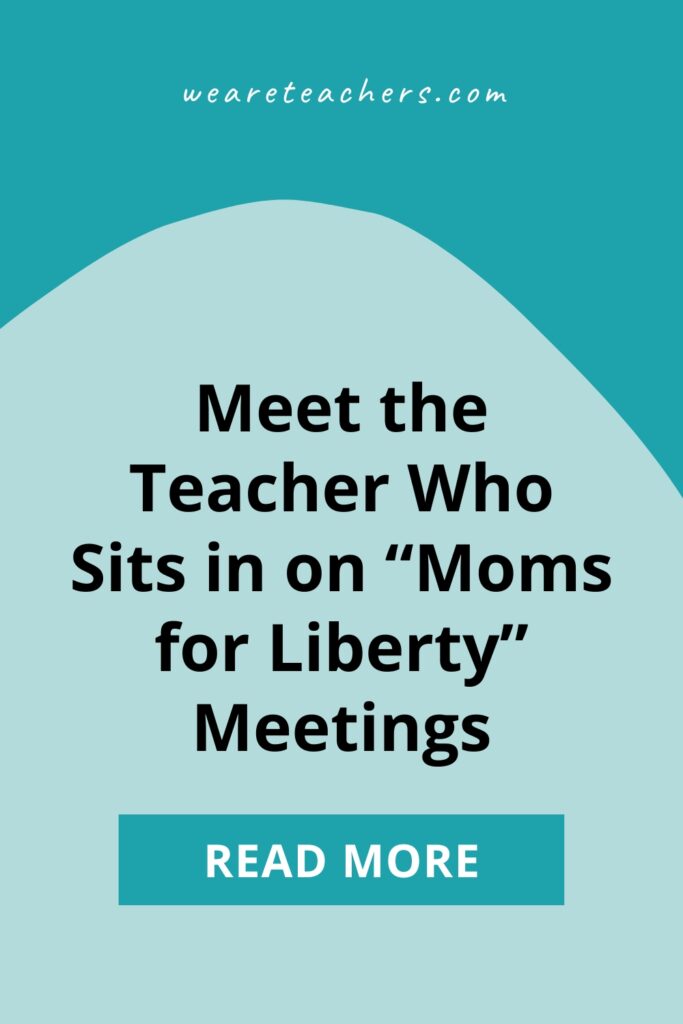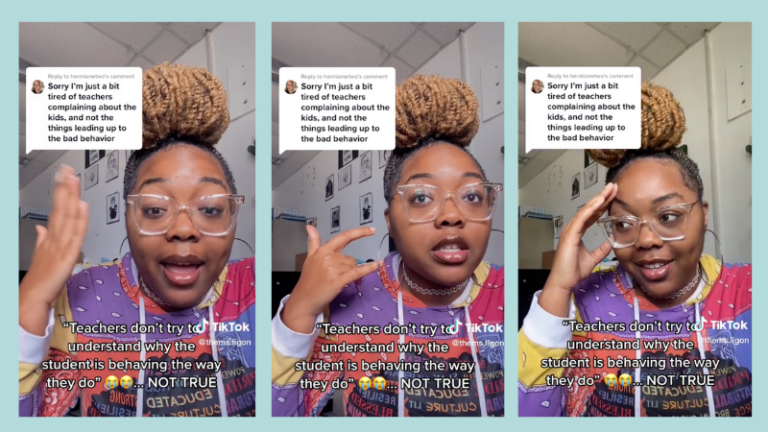Last week, the civil rights group Southern Poverty Law Center named the conservative nonprofit Moms for Liberty an extremist group for its anti–student inclusion agenda.
Moms for Liberty first started creeping into the public awareness by organizing against mask and vaccine mandates in schools in 2021. Since then, the group has moved on to the censorship of school curricula and books that mention race, LGBTQ rights, discrimination, and gender and sexuality issues.
With a membership of 70,000 people out of 258.3 million Americans (I’m using data based on adults here instead of mothers since MFL doesn’t limit themselves to people who identify as mothers), it may seem that a group that represents not even 0.03% of Americans isn’t worth putting on your radar.
But as any teacher in a school district with a vocal Moms for Liberty group will tell you, it’s time to pay attention. These members are harassing teachers and librarians, turning school board meetings into middle school yelling matches, and distracting leaders from issues that actually matter.
And their underlying motives go beyond books and masks. With a strong track record of harassment, targeting people they disagree with, and promoting a worldview that poses real harm to children, they clearly need to be watched.
This education professor in a small northeastern town thought so too. That’s why she sits in on the local Moms for Liberty meetings in her community.
Here’s what she had to say in our interview.
What is your teaching experience?
This is my 30th year in the field. I’ve taught at the elementary, middle, and high school levels. I am now in higher education, where I teach literacy and assessment courses while also serving as an instructional designer.
When and how did you find out about these meetings?
A local therapist expressed an interest in attending so that they might be able to peacefully express their concerns about the group’s apparent mission, vision, and activities.
What made you decide to join?
I didn’t join. I chose to attend meetings as a guest.
Describe what your first meeting was like.
It was clear from the outset that the group leaders were uncertain how to integrate us into the group, and so they began with a prayer that offered blessings over those who disagreed with them. I didn’t speak in this meeting, and neither did anyone seated in the audience, regardless of their position. Leaders spoke from the podium, shared their concerns about books, culturally responsive teaching, social-emotional learning, and “them.” That’s what struck me most: the consistent othering that seems to drive their thinking and behavior.
“They” are not protecting our children.
“They” do not share our values.
And also? “They” will not stop us.
As the meeting unfolded, they characterized “them” in more concerning ways as well. “They” were evil, sick groomers pushing porn in schools. “They” were doing harm by supporting trans kids.
Who are “they”? Some are teachers and administrators, but there was an overwhelming sense that even “they” were being led astray by some other unholy entity that was larger than any single teacher, school, or district.
How would you describe the overall atmosphere in the room?
I didn’t sense fear or uncertainty in this group. I heard deep conviction, bitter frustration, and explicit calls to act against teachers, administrators, parents, and children who didn’t seem to align with their values or views. Stories about MFL victories won in neighboring communities were shared beside happy anecdotes about characters within the national organization who were not to be messed with. They were pleased to call them compatriots in some strange war against “them.”
Do you participate?
While I would like to participate, when I have tried, I have been told that there is no room for discussion and that I will be removed if I speak.
What are the biggest takeaways you’ve had attending these meetings?
It’s my perception that our local Moms for Liberty intends to empower certain moms with certain liberties that appear (and only appear) to privilege certain children: their own. They seem unaware, or worse, quite aware, of the fact that there are many moms, dads, community members of all kinds, and children who do not share their values or their perspectives. They don’t seem to understand what liberty truly means, how it is protected, and most importantly, why. Or perhaps they do.
What’s something that might surprise people about these meetings?
Working groups have been established for each school district in my region, and strategic plans are in place to disrupt what educators do there in service to all children—including those who live on the margins.
These aren’t social events where radically conservative parents come together to commiserate (they do that online). These are working meetings where people with a very specific agenda are action planning and reporting on their activities and the results of them.
At the end of the last meeting I attended, where I voiced my concerns for the first time, the pastor who leads the church that is hosting this group visited my pew to engage me. He informed me that trans children are “wired wrong,” as if they were machines and not people. When I asked if he knew many trans people, he admitted that he did not. And yet, he’s empowering a crowd of people to compromise the human rights of an entire group of people.
How do you see the impact of this group in your job and in the classrooms of educators?
My concern is that when people are fearful, learning stops. People who work in education are now far more cautious about connecting with others, sharing our works in progress, and being visible in our advocacy for children who live on the margins. I have worked with teachers and administrators who find themselves devoting more and more time to managing this group’s hateful and harmful behavior, and that compromises their ability to learn together in service to the children they care about.
If MFL has impacted my own work in any way, it’s stripped the veneer from the glossy stereotype I once held of all teachers. Some should not necessarily be teaching in our schools. If I were an administrator, I wouldn’t want members of a nationally recognized hate group teaching the students in my school. If I were a parent—especially the parent of a child who lives on the margins—I would not want a Moms for Liberty member responsible for the care and education of my child.
I wonder if schools have adopted policies that prevent employees from organizing, leading, and participating in hate groups. If they haven’t, they likely should.
When is the next meeting? Will you be there?
The group is on hiatus for the summer but will return in the fall. I plan to attend meetings again then. Some have hope that conversations might begin. While a part of me hopes that’s true, I doubt the reality of it.
Many feel that Moms for Liberty is just about protecting their children from content in books that doesn’t align with their values. Even our local chapter seems to focus their efforts on pursuing parental consent for any child to borrow a book from a school library. But I think it is absolutely critical for everyone to understand the greater context here. My concern is the bigger picture: that the very design of this national organization—one led using hate and threats of violence—is to perpetuate Christian nationalism and white supremacy.
And so, I struggle with the notion that anyone should be sitting down to meet people halfway. Sometimes, there isn’t a happy middle where we can reach an agreement—especially when the other side won’t hear what you have to say. Sometimes there is just right and wrong. Imposing our values on others and limiting their freedoms is a threat to our liberty and worse—our safety.
For more articles like this, be sure to subscribe to our newsletters.


